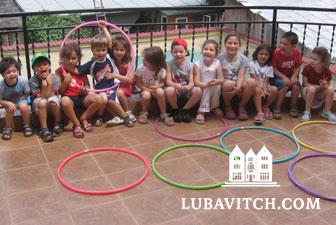Ideally, Chabad representatives to Romania would like to see Jews return to Israel. But for the growing numbers who opt to stay, Bucharest is experiencing a Jewish revival.
As Romanian society swings wide open to accommodate the recent embrace by the European Union, Jewish life in the former Eastern bloc country is experiencing a parallel sweeping change, with an influx of Israeli citizens and international businesspeople. In addition to the 15,000 Romanian Jews, Israelis have added another 10,000, according to estimates by Chabad representative, Rabbi Naftali Deutsch. Jewish embassy workers and investors riding the Romanian economic wave pump up the country’s Jewish population by another thousand or so.
They are the Chabad representatives to Romania making dynamic inroads to Jewish life there, yet ideally, Rabbi Naftali and Risha Deutsch would like to see Israelis return to their homeland. So Chabad of Romania invites Israeli speakers in for special events to pluck at the expat community’s heartstrings. But, admits Rabbi Deutsch, “It is very hard to tell people who could not make ends meet in Israel and now have work and are earning a living in Romania to go back to Israel.” A rather disheartening trend is the growing number of Romanians, who once fled the country to move to Israel, that are moving back to Bucharest. Political unrest and the difficult life of an immigrant in Israel, as compared with the opportunities emerging in Romania and the family they left behind are the siren song drawing them back.
Of the thousands of Israelis who moved to Romania since the Deutsches’ arrival eight years ago, only a handful has returned to their homeland. Many have taken prominent spots on the ground floor of the Romania’s economic boom, and are clearly staying for the long term. Among them are families expecting babies, gladdened to know that Chabad will provide a Jewish environment for their growing families. At a kindergarten established and operated by Risha Deutsch, forty children, from crawling nine-month-old babies to bounding four-and-a-half year old preschoolers, sing and explore the world, babbling away in their native Hebrew.
So for those determined to stay, the Deutschs are determined to create a vibrant Jewish experience. Indeed, while others will be vacationing on the fabled shores of the Black Sea this season, the Deutschs are staying put because local Jewish women depend on them to open the mikvah, ritual pool, in their Chabad center. “In the last six months, my wife succeeded in encouraging 20 more women to keep this mitzvah,” said Rabbi Deutsch, “we can’t leave them when they need us.”
From a prayer service that fit into one room, Chabad of Romania has grown so that a full refurbishment of the synagogue was in order. A banquet dinner to be held in February will celebrate the new space which includes a synagogue, kitchen, classrooms, library and room for the 200 people who share a Shabbat meal with Chabad each week. Sephardic Chief Rabbi of Israel Shlomo Amar, emissaries from Lubavitch World Headquarters, and Chabad representatives from Greece and Bulgaria are expected to attend.
Romania’s Jewish community dates back to the second century. In the middle ages, Benjamin of Tudela met Jews in the area that is now Romania. Chasidic dynasties of Satmar, Klausenberg and Spinka originated from the country. During the Holocaust, between 280,000 and 380,000 Romanian Jews were murdered. Of the 430,000 Jews living in Romania in 1947, according to World Jewish Congress figures, only a fraction remain. They, too, welcome Chabad’s presence. Every Passover and High Holiday season, Chabad brings in rabbinical students to host Seders and services. This year, the communities sponsored half the cost of each student’s travel and lodging. The secret to acceptance by Romania’s age old Jewish communities is respect, said Rabbi Deutsch, an attitude has earned Chabad a secure place in Romania’s growing Jewish community.
At Bucharest universities, Chabad has seen more success in its efforts to influence young Israeli students to return to the Jewish homeland. Seeking to increase its on-campus presence and to involve the 400 or so Israelis who moved beyond Bucharest, Chabad is looking into creating a new center in Yash, the third largest city in Romania. Last year, Chabad recruited Rabbi Shaya and Chavi Gerlitzky to assist with the growing demand for services. Within the next few years, Rabbi Deutsch anticipates there will be a need for two new Chabad leaders.

Be the first to write a comment.